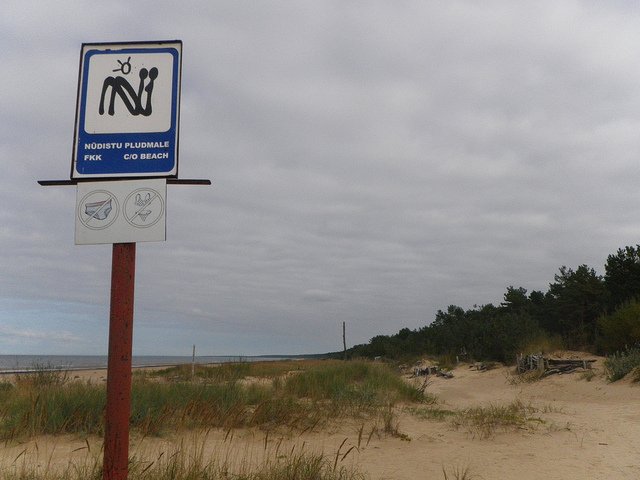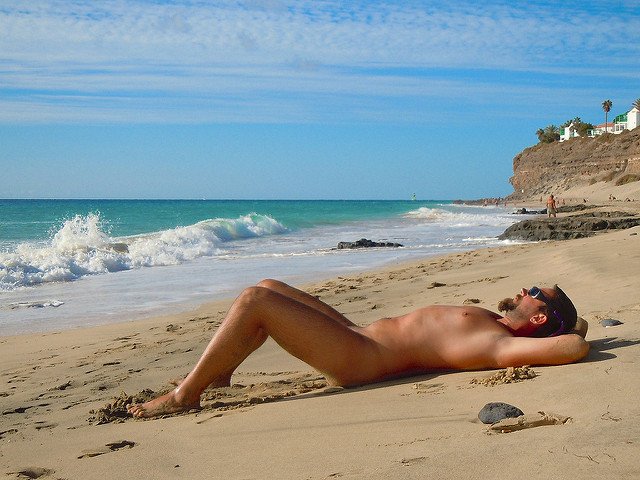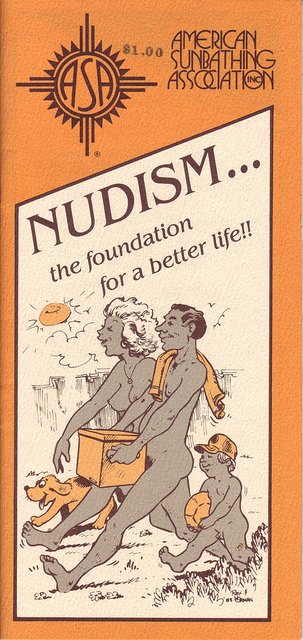THE waiters, at least, would be clothed. Public health requirements demanded as much. I knew that before walking up to the black-cloaked window of O’Naturel and ringing the doorbell of the restaurant, which remains locked for privacy. What I didn’t know was practically all the rest. ‘What if’ questions had dominated the conversation between my date Amelia and I as we had giggled over a pre-drink around the corner, earlier that evening.
“What if I spill something hot on myself?” Amelia had asked.
“What if I have to go to the bathroom?” I wondered back. When the server came over, I purposely avoided beer and ordered a whiskey—not even on the rocks.
“What if it’s just full of crusty old men who stare at me,” she said, nervously.
What if it’s not, I thought to myself. What if… but I didn’t let the last thought grow, and it collapsed, flaccid in my mind.
O’Naturel is the very first ‘naturist’ restaurant in Paris. It’s sidled away on a nondescript street in the 12th arrondissement, and coincidentally (conveniently?) not far from the bois de Vincennes, which gathered its own slurry of headlines after the city of Paris approved a nudist area in the park over the summer.
After checking my name off a list, Mike Saada, who opened the restaurant with his brother Stéphane, pointed us to the ‘vestiare,’ which hid behind a thick grey curtain to the left of the small welcome desk. Inside, lockers lined the walls above a wooden floor, and the house rules were posted on the wall. They mainly talked about respect for other diners. Full nudity, it noted, was obligatory beyond the second curtain, the one that led to the restaurant itself.
Outside I had been bundled up to brave the elements. Inside I tried to remain brave as I stripped down to my most basic elemental being. Saving my socks for last, I slowly unclothed myself, and then stepped out into the unknown.

(Photo credit: Helmut Rudzitis via Flickr)
THE dining area was bare. The walls and ceiling were white, with white ovular fixtures descending from it to throw light back down onto grey tables and chairs that were, well, clothed in sleek, black, removable coverings. (Replaced after every diner, we were assured). It was glaringly bright, and the room, in fact, felt nearly as naked as I did.
We were also alone.
As soon as I stepped past the curtain, I realized that no other naked diners were yet there to gaze back at me in my glory. I felt an unexpected mix of relief and disappointment as I sat down.
A journalist from France Inter was at the edge of the room, talking to one of the kitchen staff. She was clothed. Happy to finally have someone to interview, she made her way over to the side of our table once we were seated.
“I’m also a journalist, here to review the place,” I admitted to her, when she began asking us how we felt to be there. How often, I wondered to myself, do journalists end up interviewing other journalists? She was nonplussed, and told us just to use our first names only.
We ordered wine, two glasses of a 2014 Crozes-Hermitage. The France Inter journalist stayed by our sides, pulling out a microphone to capture the sound of the wine pouring from the bottle and the clink of the glasses.
“Your boyfriend covered himself with his napkin almost immediately,” she said to Amelia. “Do you feel uncomfortable being here?”
“It’s weird that we’re the only ones here, and they are all wearing clothes,” Amelia replied, referring to the kitchen staff and the two server-owners, who were brothers, and had started O’Naturel together.
The journalist wandered off to speak with Stéphane, her words faintly making their way back to our table. “I’m staying dressed because I don’t feel pretty,” she was saying. Then a few minutes later, “Your clients don’t seem comfortable--is that common? And isn’t it something you should work on?”
Mike came back with menus, and I glanced quickly before flipping the journalistic table, and firing off a series of my own questions. The restaurant—billed as ‘bistronomy’ (i.e., an upscale bistro)—offers two prix-fixe menus. An entrée and a main course, or a main course and a desert for €39, or a three course dinner for €49. For my starter, I skipped the escargot, lobster salad, and “salmon gravlax” options, instead choosing the medley of vegetables served with baba ganoush, a Middle Eastern spiced eggplant purée. Amelia went with foie gras, which came served with apple-pear chutney and flakes of sea salt.
We ordered our main courses at the same time. Once again, I skipped past the pescatarian options—sole meunière with an endive tatin, and scallops with a soybean emulsion. I was naked. I wanted meat. I chose lamb chops, which came with preserved tomatoes and pearl onions. Amelia ordered the scallops.
Mike shrugged off the suggestion that the naturism of the restaurant exerted an influence on the food. Actually, he told us, neither he nor his brother were convinced naturists by any means. Neither, as it turned out, were the other staff, though every applicant had been duly informed about the restaurant’s unique nature during the hiring process.
“We wanted to open a gastro-bistro,” he said. “But there are so many in Paris, so we brainstormed about what could set us apart, and we decided to do a nudist restaurant.”
I felt slightly disappointed by the cold hard truth. Had my first foray into letting it all hang out actually just been in service of a commercial gimmick?
![8097308934_068e7a1f2e_z.jpg]
(Photo credit: GioBertPhoto via Flickr)
( )
)
THERE is an immediate contrast inherent in the idea of a naked restaurant that doesn’t exist in the topless protests of Femen, streakers running through a college campus, or the proud, stoid displays of La liberté de la fesse.
We come into the world bare and breastfeeding and so utterly and completely helpless, and that existence is so very, very brief. No other living being seeks to shroud its body from the view of others, no other living being has used fire to master food. Together, clothing and cooking have allowed us to conquer the planet and its vast array of landscapes and climates. So can we talk about either nakedness or food, or both together, without talking about what it means to be human?
In the 14th century, Lalla, an Indian mystic, urged everyone who would listen, “Dance with nothing on but air. Sing wearing the sky. Look at this glowing day. What clothes could be so beautiful, or more sacred?” She, like the ancient Greek athletes who competed in the buff, was a rarity taken in a global historical context. Far more influential were Adam and Eve, who ate the raw fruit of the forbidden tree, and discovered nakedness and shame, forever linking the two in the annals of European and Mediterranean history.
From this same European continent though, a backlash emerged to the idea that the human form must remain hidden, even beyond the renaissance of nudity in French and Italian sculpture, or the brazenness of Gustave Courbet’s L’Origin du monde. After World War I, nudist camps surged in popularity in Germany and France, attracting a motley mix of socialists, pacifists, and proto-hippies.
It was enough to draw the ire of the Nazis as they rose to power in the 1930’s. Hermann Goering, who eventually stood trial at Nuremberg, identified the “so-called nudity movement” as “one of the greatest dangers for German culture and morality.” Though outlawed in Germany in 1933, naturism surged across the English Channel and in the United States, in part, spurred on by an influx of German émigrés.
George Bernard Shaw quipped of British nude sunbathing camps that he was “strongly in favour of getting rid of every scrap of clothing that we can dispense with,” and that he knew “the mischief done by making us ashamed of our bodies.” And as Brian Hoffman traces in Naked: A Cultural History of American Nudism, in 1929 three such German immigrants perhaps set up the first nudist organization in the United States over spareribs and sauerkraut, at New York City’s Café Micholob. Perhaps they too, made an unconscious connection between food and flesh.
It was Europe too, that produced the kitchen techniques that form the basis of a modern chef’s skillset, and became the major gastronomic reference point for “foodie culture.” Even as foodie-ism has expanded and incorporated traditions and ingredients from every corner of the world, its origins lie in Europe. In the appellation d’origine contrôlée of 1970’s Provence where Julia Child, Richard Olnay, James Beard and M.F.K. Fisher began the American rediscovery of real food. In the 1980s, when Carlo Petrini and a handful of compatriots birthed the Slow Food movement in the Italian hills of Piedmont.
Americans, like Eve and Adam, are prudes. Prudes huddling beneath the layers of the hyper sexualized society that surrounds them, and I am no different. Maybe it’s fitting then, that it is in Europe that nakedness and food have been joined, to tempt, as we were told, a surprising number of American tourists seeking to shed the flimsy skin of taboo.

(Photo credit: "Will" via Flickr
WHEN the entrées arrived, I was struck by their deconstructed nature. As if the food, like the diners, had been pared down to the essentials and sent out from the kitchen as unadorned as possible. My vegetables, julienned slices of carrots, radishes, cucumber, and fennel, hung out brazenly raw around a few leaves of baby spinach atop the cooked and mashed courgettes. They crunched beneath my teeth, but in an unremarkable sort of way.
Across the table from me, Amelia had to drop the arms that had been protectively raised to cover her breasts in order to pick up a fork. As she did, she shot a last furtive glance at the kitchen at the other side of the restaurant, where the same cook stood leering at her until he finally dropped his eyes and turned away. I could tell she was having a pristine moment of empathy with the foie gras in front of her, which she finally sliced through, placed on a piece of bread, topped with the blood-red berry compote, and slipped between her lips.
Through her eyes I could glimpse the feeling flashing through her mind: a piece of meat in the chair, a piece of meat on the plate.
Halfway through the first course, another pair of diners finally arrived, doubling the number of naked people in the room. Mike had told us that he and Stéphane had been pleasantly surprised by the demographic of their clientele, which of course included the expected array of tried and true nudists, but also a fair number of first-timers, with an average age of 30-35.
True to form, Christophe and Seth, who sat down at a table next to us, were both in their early 30’s. Christophe was French and Seth was from Los Angeles; their presence initiated a noticeable change in the atmosphere. We finally had naked compatriots as reinforcements. The two worlds, one clothed, one unclothed, continued to interact, but the terms felt more equal now.
Seth told us that this was the first time in five years that he has done anything nudist, after having first been completely naked around other people at a “circuit party.” We both stared blankly back, prompting him to explain.
“It’s a dance event that lasts all night and into the next day. They started in the 70’s and are making a resurgence in the gay scene now. Kind of like Berghain,” he said, referring to the famously impossible to enter Berlin club.
The arrival of my lamb chops and Amelia’s scallops cut our conversation short. There were three of them arrayed in a semicircle on the plate, surrounded by their entourage of roasted roots.
Gimmick or not, when you decide to open a restaurant where all the diners are naked, that becomes the main focus. It necessarily overshadows the food, demanding an extraordinary counterbalancing effort from the kitchen. The food needs to scream look at me, not over there! You have to get so lost in the sensation of taste that your eyes cease to matter. Every dish needs to be overwhelming, captivating, a revelation. That kind of challenge could spur preternatural amounts of creativity from the right chef, willing to push every boundary in order to tame an environment that has eliminated the most natural boundaries.
O’Naturel is none of that. The lamb was soft, and flavor popped from the fat. The scallops melded well into the sea of soybean purée in which they were placed. But there was no crescendo of conspicuous tastes. The menu is nowhere near as daring as the concept: foie gras, scallops, escargot, lobster, lamb chops, braised chicken, and the obligatory vegetarian risotto is a laundry list of has-been bistro stand-by fare. None of them done better than anyone else’s version. Which is fine for the corner bistro, but the corner bistro charges half the price. And the corner bistro is comforting, calming, not destabilizing.
We stuck to our original plan and decided not to stay for desert. Mentally prepared to pay, I slid my hand to where my pocket--and wallet--should have been, and felt only the smoothness of my thigh. I realized that I hadn’t checked my phone once in the past hour and a half. I stood up and strode past the other tables back into the vestiaire, feeling more comfortable than I had imagined I would in my own skin, but even more comfortable as I pulled my clothes back on. Outside it was a rare winter evening in Paris, one speckled with flakes of snow.
Hi! I am a robot. I just upvoted you! I found similar content that readers might be interested in:
https://www.areweeurope.com/food-content/alexander-hurst-nudist-restaurant-onaturel-paris
Congratulations @volkgeist! You received a personal award!
Click here to view your Board
Congratulations @volkgeist! You received a personal award!
You can view your badges on your Steem Board and compare to others on the Steem Ranking
Vote for @Steemitboard as a witness to get one more award and increased upvotes!